Ethical Considerations in IT: A Comparison of Theories and Practice
VerifiedAdded on 2020/11/12
|6
|1214
|421
Essay
AI Summary
This essay delves into the ethical considerations within the field of Information Technology, focusing on the application of utilitarian and deontological ethical theories in real-world scenarios. The introduction establishes the significance of ethical frameworks in decision-making within IT, emphasizing the importance of distinguishing between right and wrong actions. The core of the essay presents a case study involving a data analyst facing an ethical dilemma: accessing a colleague's system to retrieve crucial data. The analysis then contrasts utilitarianism, which prioritizes the greatest good, with deontology, which emphasizes adherence to rules and duties. The essay argues for the application of utilitarianism in the given scenario, justifying the analyst's actions based on the positive consequences for the company's security and employee well-being. The conclusion reiterates the value of these ethical theories in guiding moral decisions in the IT sector, highlighting the balance between adherence to rules and the impact of actions.
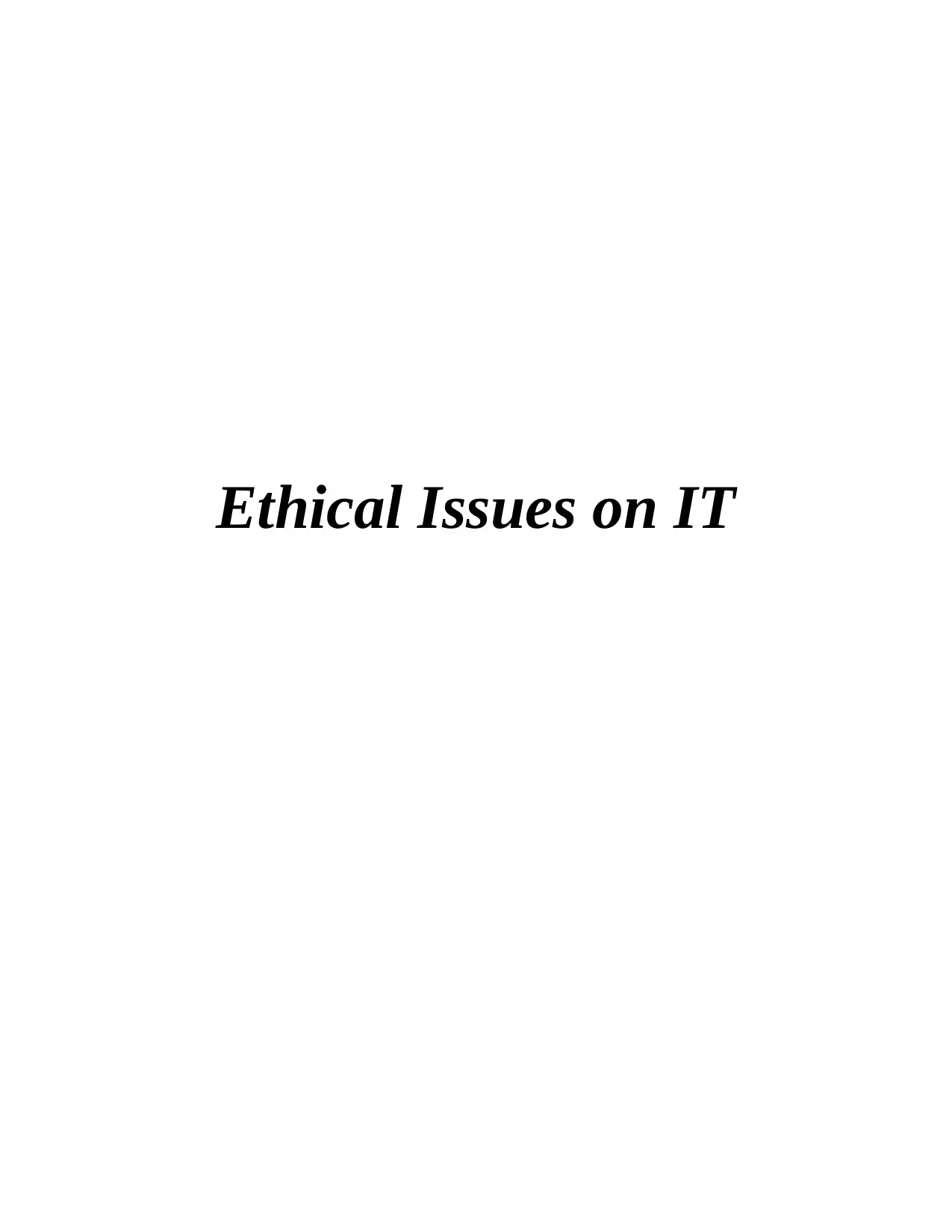
Ethical Issues on IT
Paraphrase This Document
Need a fresh take? Get an instant paraphrase of this document with our AI Paraphraser
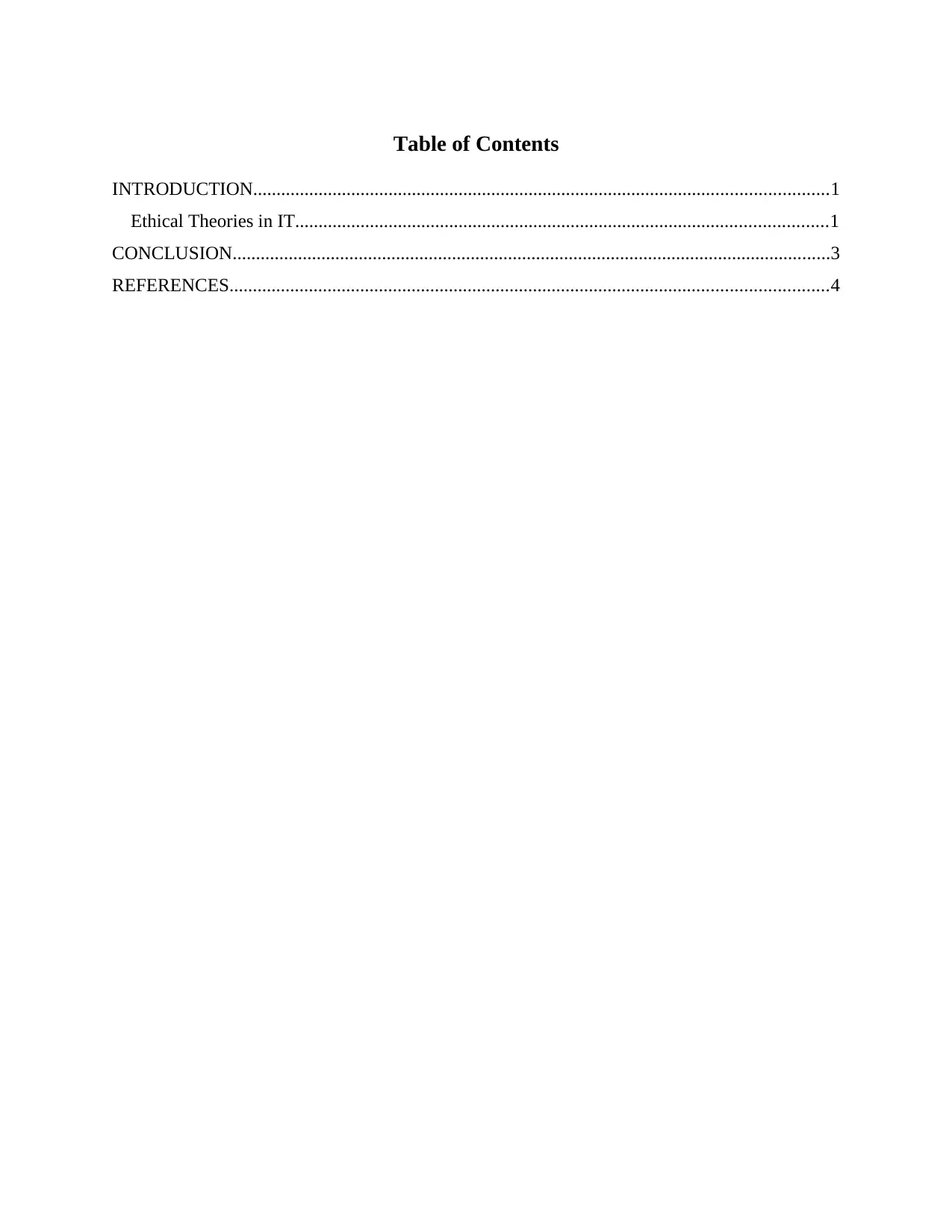
Table of Contents
INTRODUCTION...........................................................................................................................1
Ethical Theories in IT..................................................................................................................1
CONCLUSION................................................................................................................................3
REFERENCES................................................................................................................................4
INTRODUCTION...........................................................................................................................1
Ethical Theories in IT..................................................................................................................1
CONCLUSION................................................................................................................................3
REFERENCES................................................................................................................................4
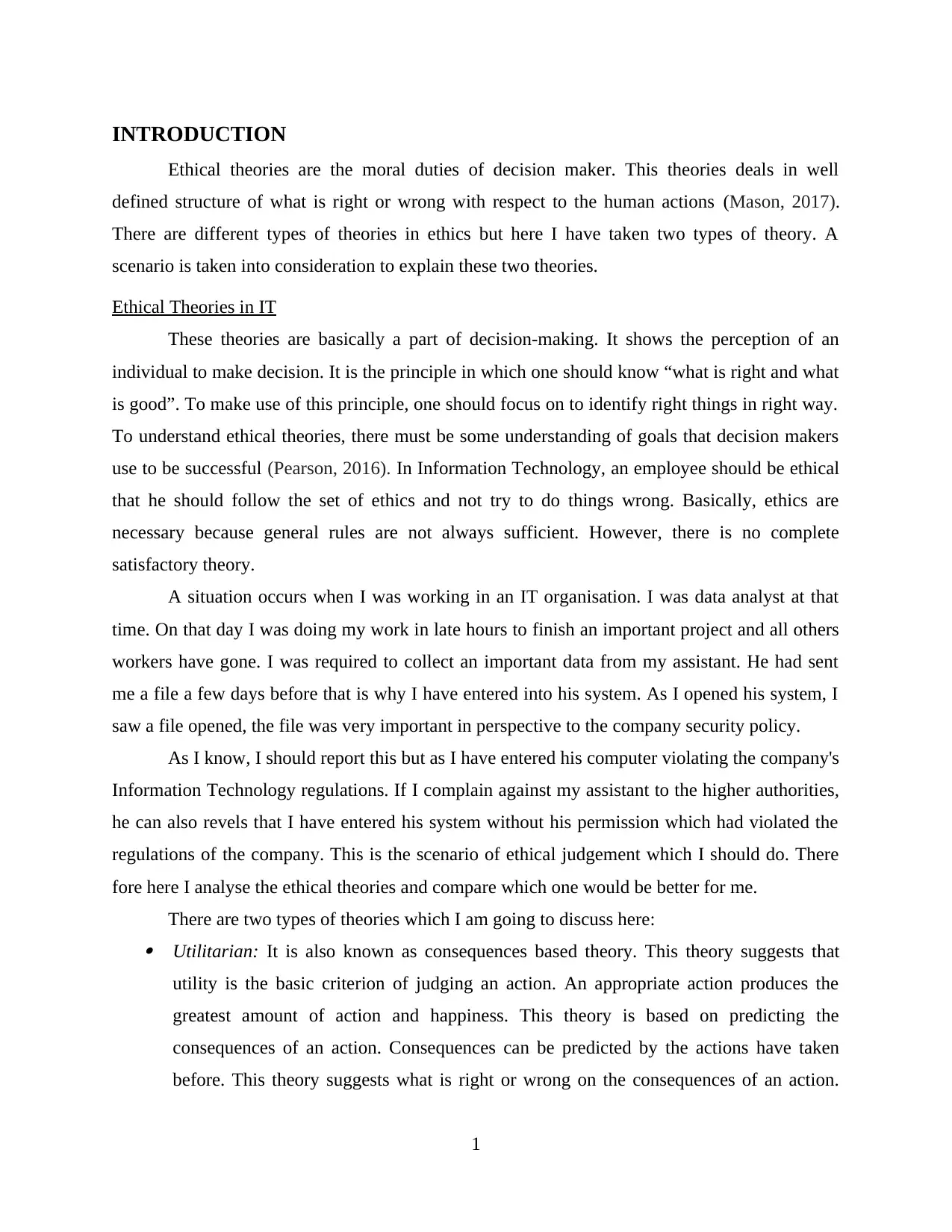
INTRODUCTION
Ethical theories are the moral duties of decision maker. This theories deals in well
defined structure of what is right or wrong with respect to the human actions (Mason, 2017).
There are different types of theories in ethics but here I have taken two types of theory. A
scenario is taken into consideration to explain these two theories.
Ethical Theories in IT
These theories are basically a part of decision-making. It shows the perception of an
individual to make decision. It is the principle in which one should know “what is right and what
is good”. To make use of this principle, one should focus on to identify right things in right way.
To understand ethical theories, there must be some understanding of goals that decision makers
use to be successful (Pearson, 2016). In Information Technology, an employee should be ethical
that he should follow the set of ethics and not try to do things wrong. Basically, ethics are
necessary because general rules are not always sufficient. However, there is no complete
satisfactory theory.
A situation occurs when I was working in an IT organisation. I was data analyst at that
time. On that day I was doing my work in late hours to finish an important project and all others
workers have gone. I was required to collect an important data from my assistant. He had sent
me a file a few days before that is why I have entered into his system. As I opened his system, I
saw a file opened, the file was very important in perspective to the company security policy.
As I know, I should report this but as I have entered his computer violating the company's
Information Technology regulations. If I complain against my assistant to the higher authorities,
he can also revels that I have entered his system without his permission which had violated the
regulations of the company. This is the scenario of ethical judgement which I should do. There
fore here I analyse the ethical theories and compare which one would be better for me.
There are two types of theories which I am going to discuss here: Utilitarian: It is also known as consequences based theory. This theory suggests that
utility is the basic criterion of judging an action. An appropriate action produces the
greatest amount of action and happiness. This theory is based on predicting the
consequences of an action. Consequences can be predicted by the actions have taken
before. This theory suggests what is right or wrong on the consequences of an action.
1
Ethical theories are the moral duties of decision maker. This theories deals in well
defined structure of what is right or wrong with respect to the human actions (Mason, 2017).
There are different types of theories in ethics but here I have taken two types of theory. A
scenario is taken into consideration to explain these two theories.
Ethical Theories in IT
These theories are basically a part of decision-making. It shows the perception of an
individual to make decision. It is the principle in which one should know “what is right and what
is good”. To make use of this principle, one should focus on to identify right things in right way.
To understand ethical theories, there must be some understanding of goals that decision makers
use to be successful (Pearson, 2016). In Information Technology, an employee should be ethical
that he should follow the set of ethics and not try to do things wrong. Basically, ethics are
necessary because general rules are not always sufficient. However, there is no complete
satisfactory theory.
A situation occurs when I was working in an IT organisation. I was data analyst at that
time. On that day I was doing my work in late hours to finish an important project and all others
workers have gone. I was required to collect an important data from my assistant. He had sent
me a file a few days before that is why I have entered into his system. As I opened his system, I
saw a file opened, the file was very important in perspective to the company security policy.
As I know, I should report this but as I have entered his computer violating the company's
Information Technology regulations. If I complain against my assistant to the higher authorities,
he can also revels that I have entered his system without his permission which had violated the
regulations of the company. This is the scenario of ethical judgement which I should do. There
fore here I analyse the ethical theories and compare which one would be better for me.
There are two types of theories which I am going to discuss here: Utilitarian: It is also known as consequences based theory. This theory suggests that
utility is the basic criterion of judging an action. An appropriate action produces the
greatest amount of action and happiness. This theory is based on predicting the
consequences of an action. Consequences can be predicted by the actions have taken
before. This theory suggests what is right or wrong on the consequences of an action.
1
⊘ This is a preview!⊘
Do you want full access?
Subscribe today to unlock all pages.

Trusted by 1+ million students worldwide
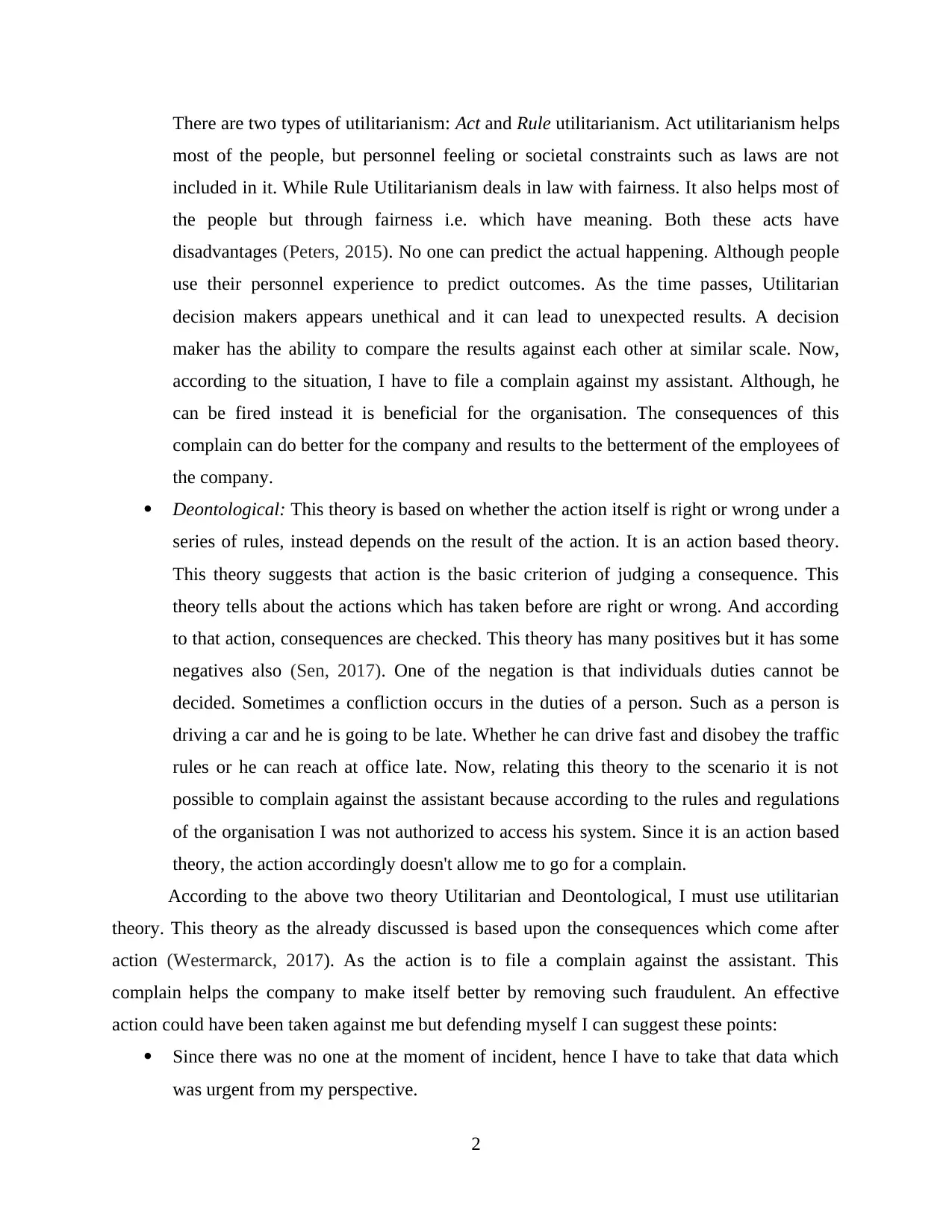
There are two types of utilitarianism: Act and Rule utilitarianism. Act utilitarianism helps
most of the people, but personnel feeling or societal constraints such as laws are not
included in it. While Rule Utilitarianism deals in law with fairness. It also helps most of
the people but through fairness i.e. which have meaning. Both these acts have
disadvantages (Peters, 2015). No one can predict the actual happening. Although people
use their personnel experience to predict outcomes. As the time passes, Utilitarian
decision makers appears unethical and it can lead to unexpected results. A decision
maker has the ability to compare the results against each other at similar scale. Now,
according to the situation, I have to file a complain against my assistant. Although, he
can be fired instead it is beneficial for the organisation. The consequences of this
complain can do better for the company and results to the betterment of the employees of
the company.
Deontological: This theory is based on whether the action itself is right or wrong under a
series of rules, instead depends on the result of the action. It is an action based theory.
This theory suggests that action is the basic criterion of judging a consequence. This
theory tells about the actions which has taken before are right or wrong. And according
to that action, consequences are checked. This theory has many positives but it has some
negatives also (Sen, 2017). One of the negation is that individuals duties cannot be
decided. Sometimes a confliction occurs in the duties of a person. Such as a person is
driving a car and he is going to be late. Whether he can drive fast and disobey the traffic
rules or he can reach at office late. Now, relating this theory to the scenario it is not
possible to complain against the assistant because according to the rules and regulations
of the organisation I was not authorized to access his system. Since it is an action based
theory, the action accordingly doesn't allow me to go for a complain.
According to the above two theory Utilitarian and Deontological, I must use utilitarian
theory. This theory as the already discussed is based upon the consequences which come after
action (Westermarck, 2017). As the action is to file a complain against the assistant. This
complain helps the company to make itself better by removing such fraudulent. An effective
action could have been taken against me but defending myself I can suggest these points:
Since there was no one at the moment of incident, hence I have to take that data which
was urgent from my perspective.
2
most of the people, but personnel feeling or societal constraints such as laws are not
included in it. While Rule Utilitarianism deals in law with fairness. It also helps most of
the people but through fairness i.e. which have meaning. Both these acts have
disadvantages (Peters, 2015). No one can predict the actual happening. Although people
use their personnel experience to predict outcomes. As the time passes, Utilitarian
decision makers appears unethical and it can lead to unexpected results. A decision
maker has the ability to compare the results against each other at similar scale. Now,
according to the situation, I have to file a complain against my assistant. Although, he
can be fired instead it is beneficial for the organisation. The consequences of this
complain can do better for the company and results to the betterment of the employees of
the company.
Deontological: This theory is based on whether the action itself is right or wrong under a
series of rules, instead depends on the result of the action. It is an action based theory.
This theory suggests that action is the basic criterion of judging a consequence. This
theory tells about the actions which has taken before are right or wrong. And according
to that action, consequences are checked. This theory has many positives but it has some
negatives also (Sen, 2017). One of the negation is that individuals duties cannot be
decided. Sometimes a confliction occurs in the duties of a person. Such as a person is
driving a car and he is going to be late. Whether he can drive fast and disobey the traffic
rules or he can reach at office late. Now, relating this theory to the scenario it is not
possible to complain against the assistant because according to the rules and regulations
of the organisation I was not authorized to access his system. Since it is an action based
theory, the action accordingly doesn't allow me to go for a complain.
According to the above two theory Utilitarian and Deontological, I must use utilitarian
theory. This theory as the already discussed is based upon the consequences which come after
action (Westermarck, 2017). As the action is to file a complain against the assistant. This
complain helps the company to make itself better by removing such fraudulent. An effective
action could have been taken against me but defending myself I can suggest these points:
Since there was no one at the moment of incident, hence I have to take that data which
was urgent from my perspective.
2
Paraphrase This Document
Need a fresh take? Get an instant paraphrase of this document with our AI Paraphraser
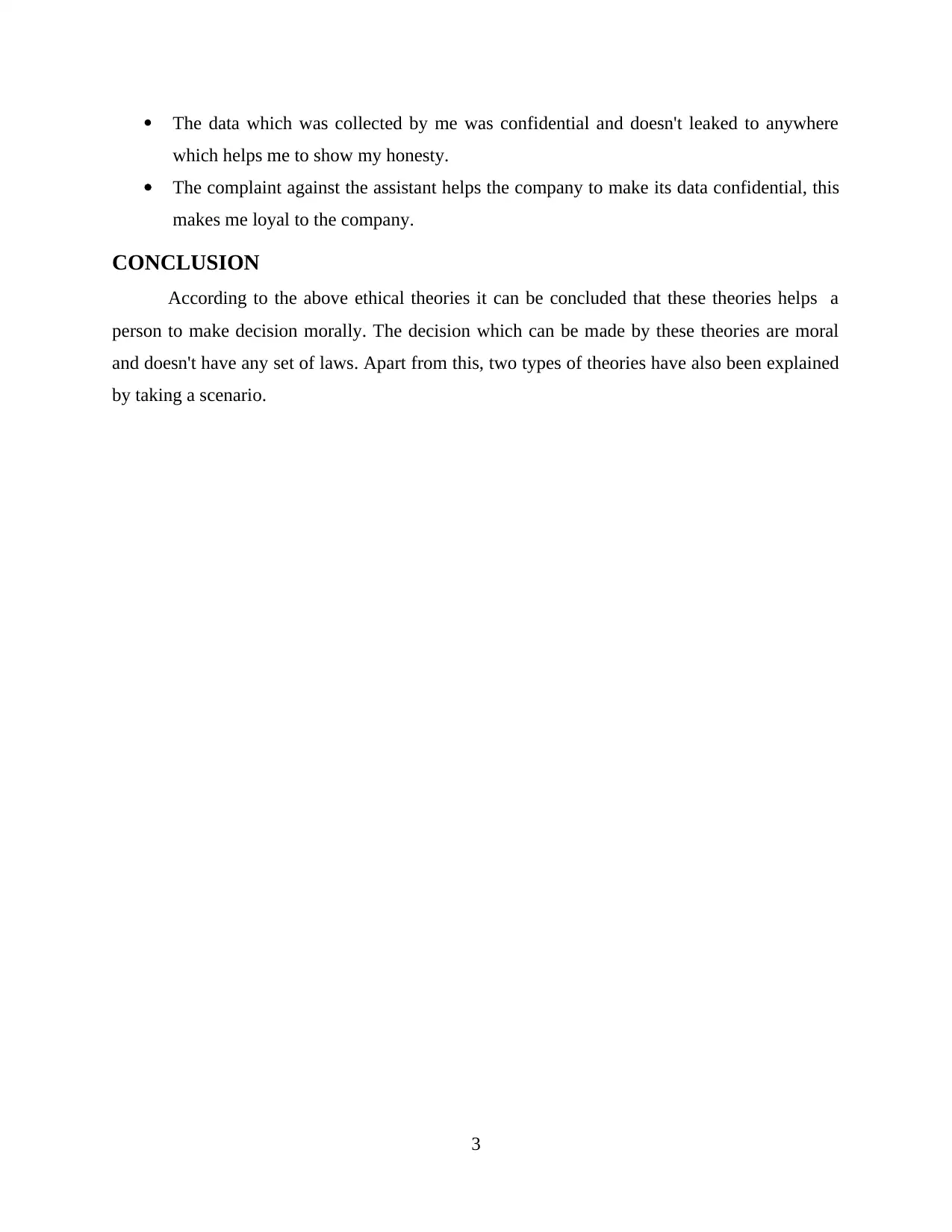
The data which was collected by me was confidential and doesn't leaked to anywhere
which helps me to show my honesty.
The complaint against the assistant helps the company to make its data confidential, this
makes me loyal to the company.
CONCLUSION
According to the above ethical theories it can be concluded that these theories helps a
person to make decision morally. The decision which can be made by these theories are moral
and doesn't have any set of laws. Apart from this, two types of theories have also been explained
by taking a scenario.
3
which helps me to show my honesty.
The complaint against the assistant helps the company to make its data confidential, this
makes me loyal to the company.
CONCLUSION
According to the above ethical theories it can be concluded that these theories helps a
person to make decision morally. The decision which can be made by these theories are moral
and doesn't have any set of laws. Apart from this, two types of theories have also been explained
by taking a scenario.
3
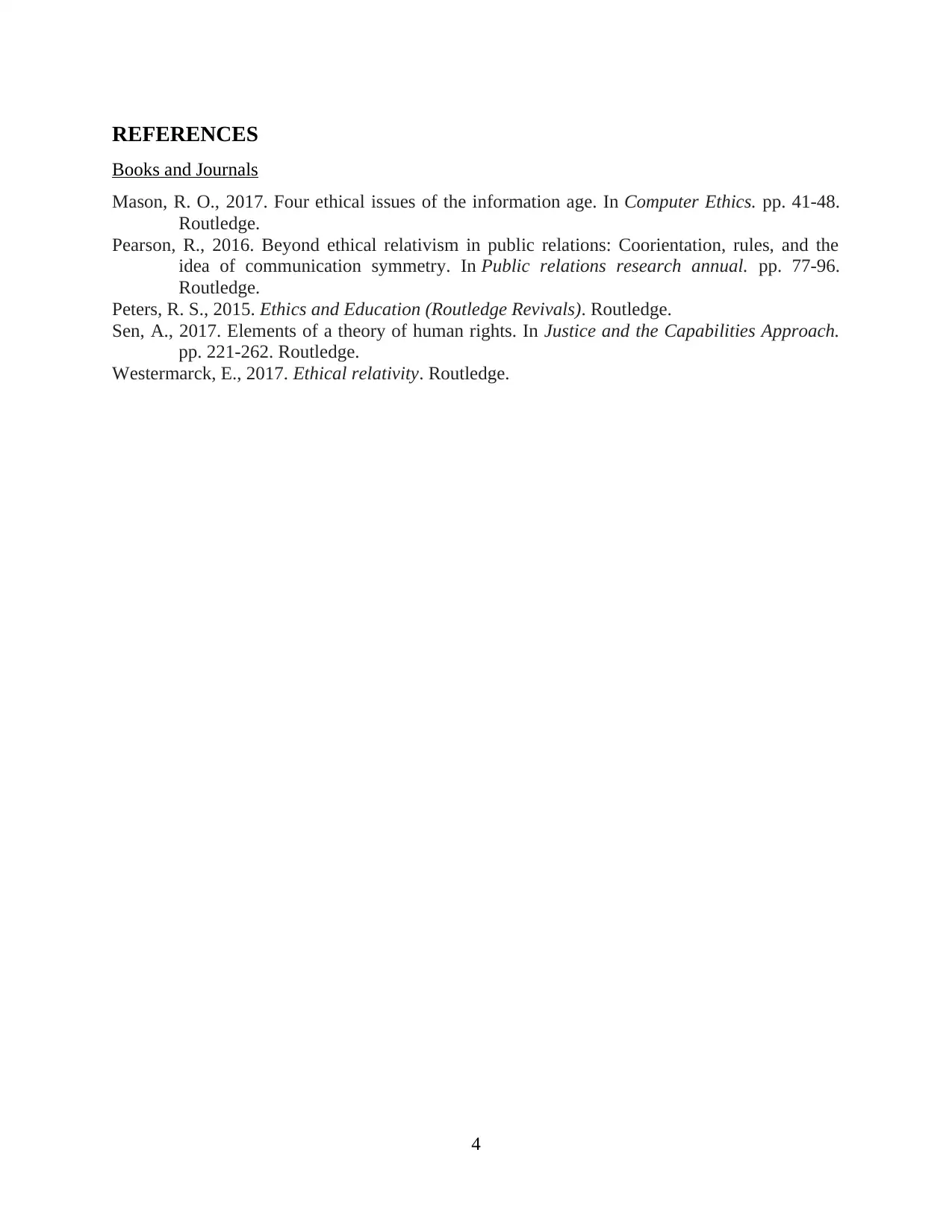
REFERENCES
Books and Journals
Mason, R. O., 2017. Four ethical issues of the information age. In Computer Ethics. pp. 41-48.
Routledge.
Pearson, R., 2016. Beyond ethical relativism in public relations: Coorientation, rules, and the
idea of communication symmetry. In Public relations research annual. pp. 77-96.
Routledge.
Peters, R. S., 2015. Ethics and Education (Routledge Revivals). Routledge.
Sen, A., 2017. Elements of a theory of human rights. In Justice and the Capabilities Approach.
pp. 221-262. Routledge.
Westermarck, E., 2017. Ethical relativity. Routledge.
4
Books and Journals
Mason, R. O., 2017. Four ethical issues of the information age. In Computer Ethics. pp. 41-48.
Routledge.
Pearson, R., 2016. Beyond ethical relativism in public relations: Coorientation, rules, and the
idea of communication symmetry. In Public relations research annual. pp. 77-96.
Routledge.
Peters, R. S., 2015. Ethics and Education (Routledge Revivals). Routledge.
Sen, A., 2017. Elements of a theory of human rights. In Justice and the Capabilities Approach.
pp. 221-262. Routledge.
Westermarck, E., 2017. Ethical relativity. Routledge.
4
⊘ This is a preview!⊘
Do you want full access?
Subscribe today to unlock all pages.

Trusted by 1+ million students worldwide
1 out of 6
Related Documents
Your All-in-One AI-Powered Toolkit for Academic Success.
+13062052269
info@desklib.com
Available 24*7 on WhatsApp / Email
![[object Object]](/_next/static/media/star-bottom.7253800d.svg)
Unlock your academic potential
Copyright © 2020–2026 A2Z Services. All Rights Reserved. Developed and managed by ZUCOL.





